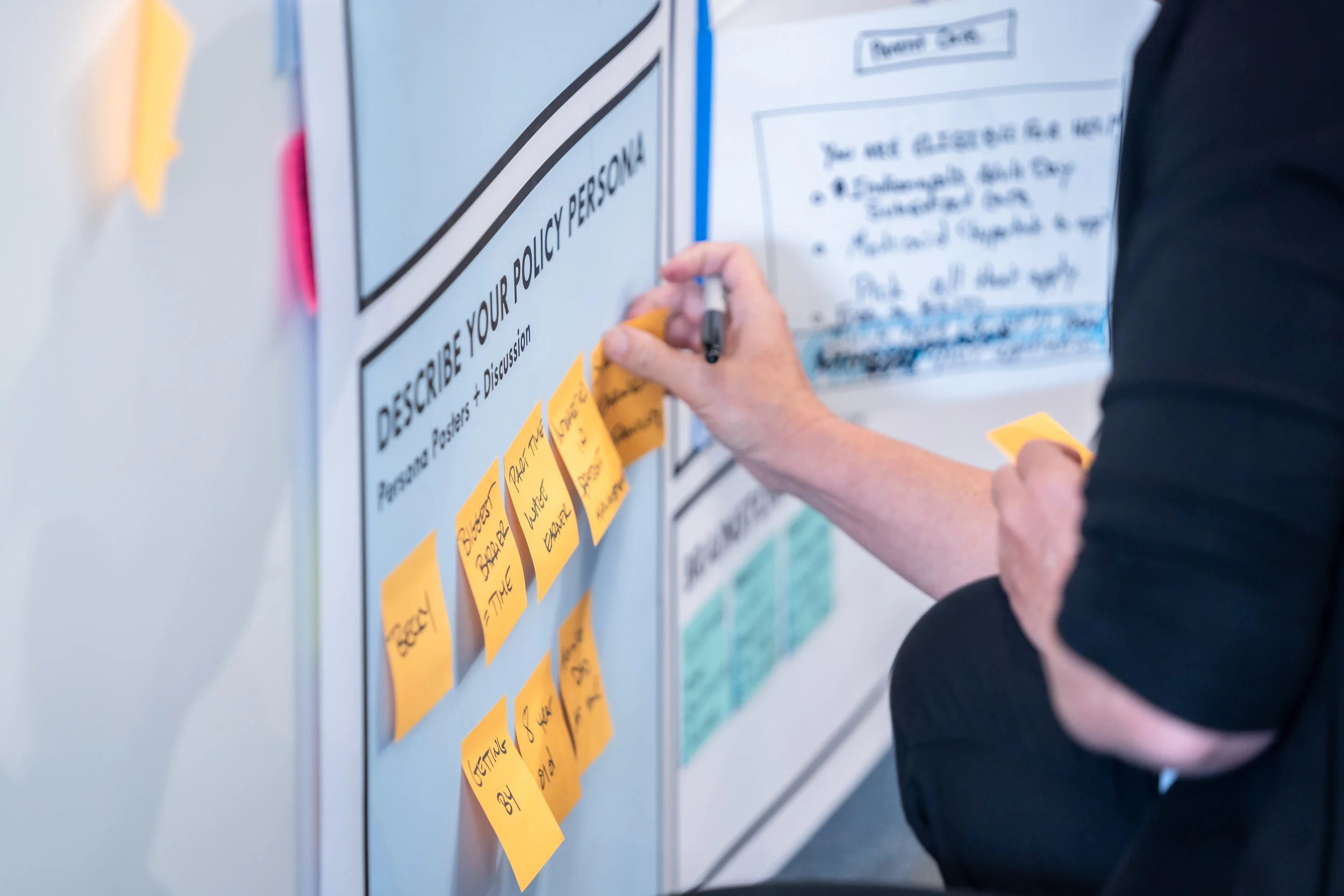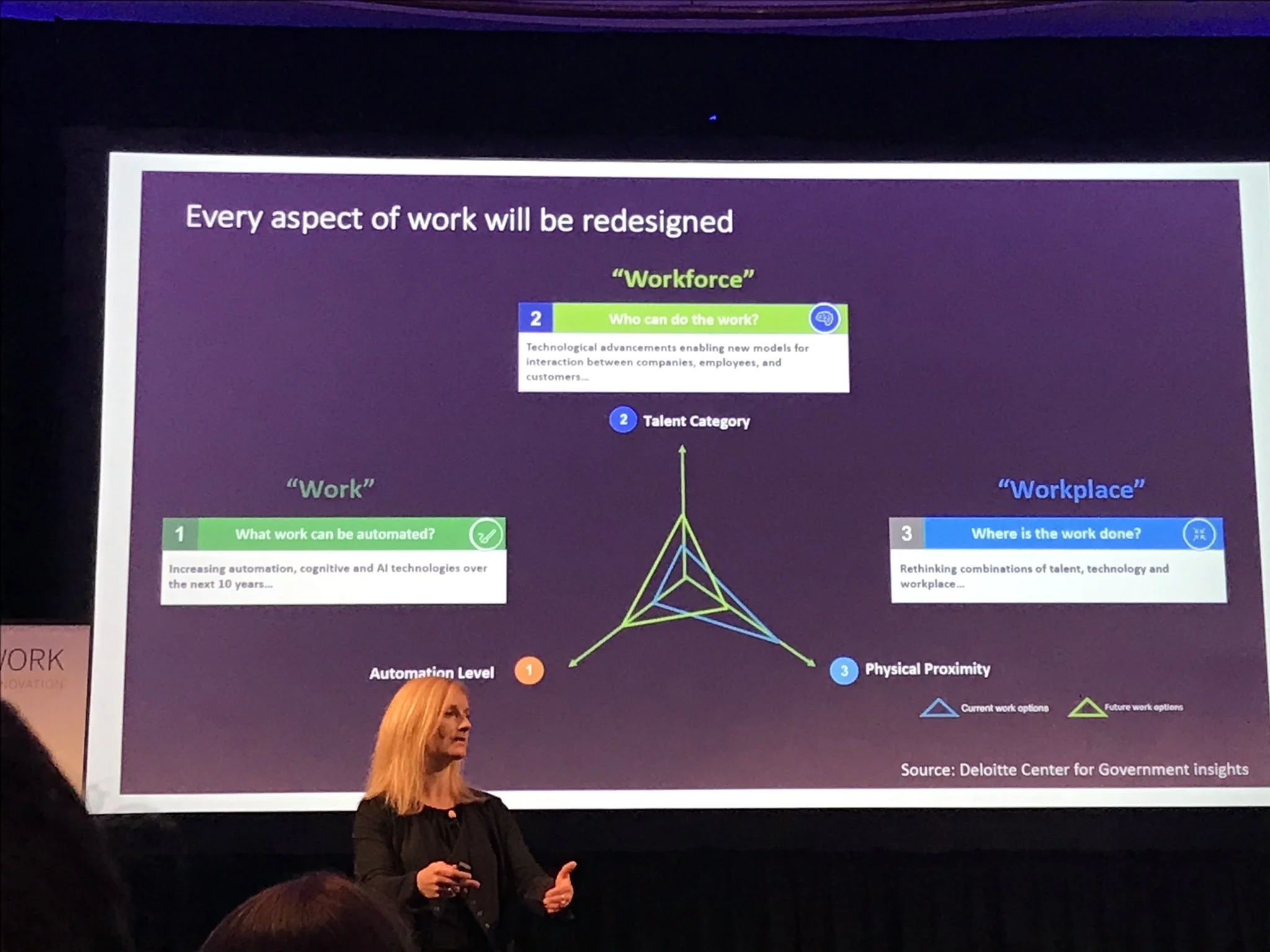As my 2018-19 DigitalHKS fellowship with the Harvard Kennedy School focused on the Future of Work comes to a formal close this week I wanted to take a moment to share a consolidated list of the resulting products publicly released to date.
Visualizing Jobs of the Future: Putting People at the Center in the Future of Work
It is clear there is not a consensus on what the overall job loss or creation impact of emerging technologies could be with wide ranging estimates of across sectors. Further, while predictions for job loss like these abound, there are far fewer organizations working on envisioning the future of work and the jobs of the future that will employ the workforce of the future as current jobs are changed by automation and other emerging technologies.
This is where I’ve focused my research with my digitalHKS research fellowship. Since January 2018 I’ve been collaborating with Bill Eggers and Amrita Datar from the Deloitte Center for Government insights to humanize the future of work and visualize the impact of technology on jobs to empower organizations, employees, and individuals to create a more positive future.
Beyond Hackathons: Using Design Thinking to Address Local Challenges with DT:DC’s Summer of Design
Today, apps contests, hackathons and data jams abound at the federal, state and local level in both government and industry. These engagements seek to harness the intellectual power of increasingly capable and bountiful developers, increase customer and public engagement with brands and government agencies, and solve tough problems while stimulating spinoff innovation while they’re at it. But what if you’re not a developer? What if the problem isn’t only one of data and technology? How might other skill sets and problem solving processes be used to amplify the effectiveness of challenges in developing sustainable, appropriate solutions?
More specifically: How might we channel the energy and potential of 1300+ passionate designers, innovators, entrepreneurs and technologists in the DC community thirsting for (1) new skills and tools in recognition of new trends in that ways we work within society and (2) productive ways to apply those skills and contribute to the numerous problems our local community faces?
This summer, Design Thinking DC (DT:DC) is testing a pretty radical hypothesis about how to build upon the practices of challenge-driven open innovation, crowdsourcing, and design thinking to make local impact through our Summer of Design:
Hypothesis: Our community can make significant headway on a number of wicked problems that local organizations and stakeholders face through the application of a Design Thinking process and a volunteer based, challenge-driven approach.
Outside of my “day job” (federal open government, open innovation and incentive prizes), for the last two years I’ve been helping to co-organize the design thinking community in DC through DT:DC founded by Stephanie Rowe in 2011. This community has steadily grown to more than 1300 people today. DT:DC’s Summer of Design is an attempt to test the hypothesis articulated above through a series of events in which volunteers from DT:DC apply design thinking techniques to real problems faced by organizations in our local community.
This team-based design competition was structured to include introductory workshops on design thinking and prototyping and a six-week design challenge. After the workshops, each team works independently and structures its own approach to researching, prototyping and designing their solution to the design challenge they’re addressing. Through a competitive application process, DT:DC selected challenge organizations earlier this summer who have design and/or business challenges that would benefit from the multidisciplinary collaboration, thinking and prototyping of our Summer of Design volunteer teams. We announced those design challenges last night at 1776 at a kick-off event sponsored by the DC Department of Small and Local Business Development. We are happy to share that we have an incredibly diverse and rich set of challenges for the design teams to address over the coming weeks including:
Title: Leveraging Open Data to Drive Better Decision Making
Challenge Organization: DC Action for Children
Design Challenge: How might we help at-risk children in DC by connecting the people who serve them to the data they need to be change-makers in key policy areas like education, health and poverty-reduction?
Title: Rapid Information Gathering in Crisis Situations
Challenge Organization: Internews
Design Challenge: How might we redesign the way we collect critical information in crisis situations, such as natural disasters, to quickly understand and fulfill the needs of those directly affected by the crisis?
Title: Inspiring Government Performance
Challenge Organization: Performance Improvement Council
Design Challenge: How might the PIC reintroduce and rebrand Performance Management to government employees so that they are better equipped to identify, solve, and communicate the current and emerging wicked problems facing US citizens?
While the DTDC Summer of Design Leadership Team (Dawan Stanford, Arty Rivera, Wendi Chiong, Brent Davidson, Nathan Ritter, Stephanie Wade, Ryann Hoffman, and yours truly) has worked diligently to design the challenges with the organizations, structure the check-ins throughout the design period, and facilitate workshops to familiarize participants with design thinking methods, the next stage of the Summer of Design is largely up to the teams. For the next 6 weeks our teams will be working to develop solutions to these design challenges following a design thinking process. Winners for each challenge will be announced in September. The energy is palpable now that the teams have been unleashed on the challenges and we’re excited to see what they come up with!
By the end of the fall, after the conclusion of Summer of Design and the initial indications from the partner organizations about the sustainability of the solutions, we hope to have a variety of rich insights:
- Beyond hackathons: Are curated design challenges an effective means for channeling local engagement beyond “apps contests”, “hackathons”, single volunteer events, town halls, etc…? What’s the anatomy of a successful design challenge?
- Participation rates and incentives: What percentage of our local DC design community ultimately self-selected to participate in this type of intense, case based activity? Why did they self-select? What did the drop out rate look like? What incentive structures attracted meaningful participation? How could this scale to other cities?
- Problem suitability: What types of local, wicked problems can be meaningfully re-thought through a design thinking approach? Where does this approach to problem solving have maximum impact relative to other problem solving methods?
- Viability of approach: What are the cultural or political challenges that organizations face that raise fear and prevent them from innovating? How can we successfully introduce and harness the enthusiasm volunteers have to develop appropriate solutions when working in an open source format?
We look forward to sharing these insights and other with you as the Summer of Design progresses. So what’s your prediction? Will our hypothesis be correct?



